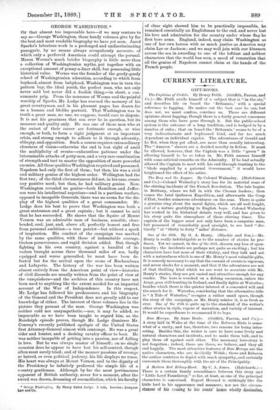GEORGE WASHINGTON.*
Or that almost too impeccable hero—if we may venture to say so—George Washington, these handy volumes give by far the best and most readable biography we have yet seen. Jared Spaxks's laborious work is a prolonged and undiscriminating panegyric, by no means always scrupulously accurate, of which only a perfervid American could attempt the perusal. Mason Weems's much briefer biography is little more than a collection of Washingtonian myths, put together with an exceptional amount of penny-a-liner skill, but possessing little historical value. Weems was the founder of the goody-goody school of Washingtonian adoration, according to which from boyhood, almost from babyhood, Washington was in turn the pattern boy, the ideal youth, the perfect man, who not only never said but never did a foolish thing,—in short, a con- summate prig. From the nonsense of Weems and the painful worship of Sparks, Mr. Lodge has rescued the memory of his great countryman, and in his pleasant pages has drawn for us a human and lifelike portrait. That Washington was in truth a great man, no one, we suppose, would care to dispute. It is not his greatness that can ever be in question, but its measure and quality only. He was one of those men who at the outset of their career are fortunate enough, or wise enough, or both, to form a right judgment at an important crisis, and strong enough to adhere to it through adversity, obloquy, and opposition. Such a course requires extraordinary clearness of vision—otherwise the end is lost sight of amid the multiplicity of events—exhaustless patience under the interminable attacks of petty men, and a very rare combination of strength and tact to master the opposition of more powerful enemies. All these qualities Washington required and possessed. Napoleon had only the first of them ; but then, his was a civil and military genius of the highest order. Wellington had the first two ; of the third circumstances did not, in his case, create any positive need; but then, he had 'military genius. Now, Washington revealed no genius—both Hamilton and Jeffer- son were his intellectual superiors—and in a partisan warfare, opposed to incapable Generals, there was no arena for the dis- play of the highest qualities of a great commander. Mr. Lodge does his best to prove that Washington was both a great statesman and a great captain ; but it cannot be said that he has succeeded. He shows that the Squire of Mount Vernon was an admirable man of business, sensible, clear- headed, cool, just, and, above all, perfectly honest and free from personal ambition—a true patriot—but without a spark of inspiration. His conduct of the campaign was marked by the same qualities, with those of indomitable courage, tireless perseverance, and rapid decision added. But, though fighting in his own country, against a handful of in- vaders brought across three thousand miles of sea, badly equipped and worse generalled, he must have been de- feated but for the arrival upon the scene of Rochambeau and Lafayette. The history of the war has been written almost entirely from the American point of view—histories of civil discords are usually written from the point of view of the vanquishers—and the archives of this country have not been used to anything like the extent needed for an impartial account of the War of Independence. In this respect, Mr. Lodge has followed his predecessors, and his biography of the General and the President does not greatly add to our knowledge of either. The interest of these volumes lies in the picture they present of the man. George Washington was neither cold nor unsympathetic,—nor, it may be added, so impeccable as we have been taught to regard him, as the Randolph episode proves, though Mr. Lodge dismisses Mr. Conway's recently published apologia of the United States first Attorney-General almost with contempt. He was a great rider and hunter, and a dashing cavalry officer to boot. He was neither incapable of getting into a passion, nor of falling in love. But he was always master of himself ; on no single occasion does he appear to have lost his self-control, though often most sorely tried; and of the meaner passions of revenge or hatred, or even political jealousy, his life displays no trace. His heart was always at Mount Vernon, and to the dignity of the Presidency he infinitely preferred the simple life of a cpuntry gentleman. Although by far the most pertinacious opponent of British authority, never for a moment, after the sword was drawn, dreaming of reconciliation, which his faculty * George Washington, By Henry Cabot Lodge. 2 yob, London; gawrion Low and Co.
of clear sight showed him to be practically impossible, he remained essentially an Englishman to the end, and never lost his love and admiration for the country under whose flag he first bore arms. England, indeed, may claim Washington as one of her own heroes with as much justice as America may claim Lee or Jackson ; and we may well join with our kinsmen across the sea in awarding to one of the loftiest and noblest characters that the world has seen, a meed of veneration that all the genius of Napoleon cannot claim at the hands of the French people.










































 Previous page
Previous page